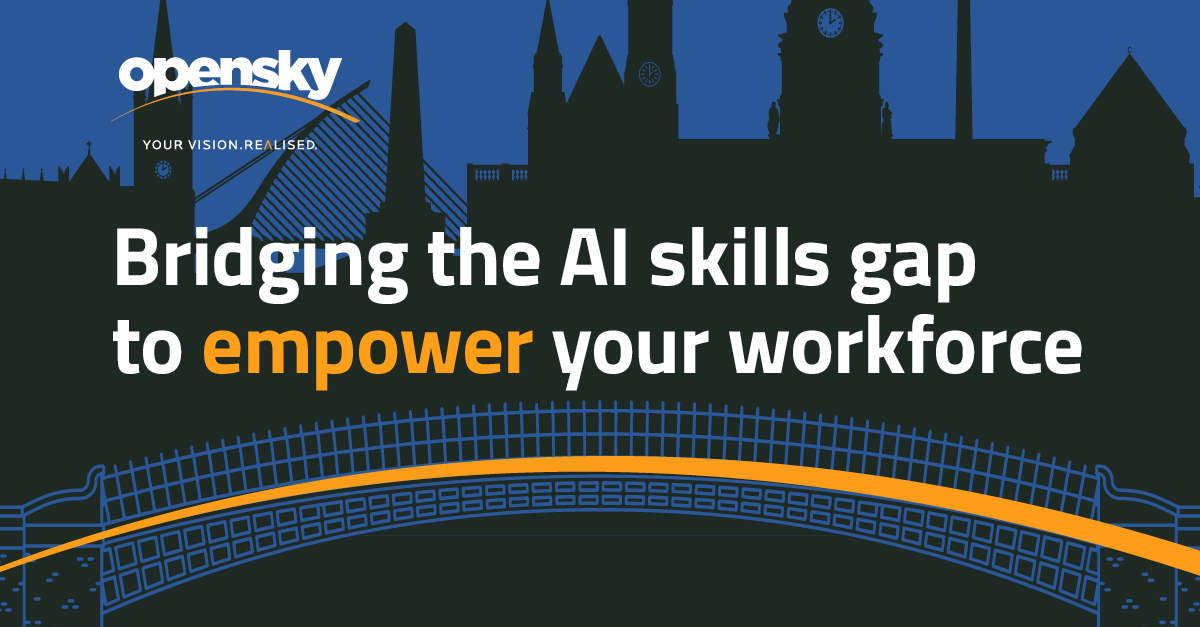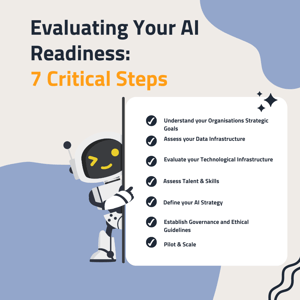Bridging the AI Expertise Gap Practical Steps
This blog outlines practical steps IT leaders can take to address the AI skills shortage, positioning their organisations for success in the AI-driven future.
If you’re an IT leader in a large enterprise organisation, your challenge is not only in adopting AI within the current systems in the organisation, but in doing this effectively by ensuring that your team possess the right skills and knowledge to maintain and evolve the efforts you’re making. The AI expertise gap is a growing concern and with strategic actions, the gap can be bridged. This blog outlines practical steps IT leaders can take to address this skills shortage, positioning their organisations for success in the AI-driven future.
1. Assess your Current AI Capabilities
The first step in bridging the AI expertise gap is understanding where your organisation currently stands. Conduct a comprehensive skills audit to identify both strengths and gaps in your team's AI capabilities. This assessment should cover various aspects of AI, including data science, machine learning, natural language processing, and ethical AI use. Understanding your current position will help you make informed decisions about where to focus your upskilling efforts.
💥 Action: Collaborate with your HR team to conduct a skills audit. You're not in this alone. Together, you can map out your team's current AI capabilities, turning what might seem like a daunting task into a manageable and insightful project.
2. Foster a Culture of Continuous Learning
As you already know, AI evolves at a breakneck pace. What's cutting-edge today might be obsolete tomorrow. Cultivating a culture of continuous learning within your team is crucial when integrating AI. Encourage your team to stay abreast of the latest AI trends, technologies, and best practices. This can be facilitated through regular training sessions, workshops, and encouraging attendance at AI conferences. Consider implementing a learning management system (LMS) that offers courses and resources focused on AI and related technologies.
💥 Action: Initiate a 'Learning Friday' where team members dedicate a few hours to exploring new AI technologies or methodologies. This small step can ignite a culture of curiosity and continuous improvement, making the vast field of AI learning feel more accessible.
3. Leverage External Expertise
While developing internal capabilities is essential, don't overlook the value of external expertise. Partnering with AI consulting firms, like OpenSky, can provide your team with the knowledge and experience needed to accelerate your AI initiatives. These partnerships can offer bespoke training, mentorship, and even help in implementing AI solutions tailored to your organisation's needs. By collaborating with experts, you can bridge the expertise gap more efficiently while also gaining insights into industry best practices.
💥 Action: Consider a short-term partnership with an AI consultancy for a specific project. This approach allows your team to gain hands-on experience and insights from experts without the long-term commitment, making the idea of external collaboration both practical and immediately beneficial.
4. Invest in Talent Development and Acquisition
Investing in your existing talent through upskilling and reskilling programs is vital. However, in some cases, you may need to bring in new talent with specific AI expertise. This dual approach ensures that your organisation has a robust pipeline of AI skills. When hiring, look for candidates who not only have the technical skills but also possess a growth mindset and the ability to adapt to new technologies and methodologies.
💥 Action: Start with a pilot program for AI upskilling in one department. By focusing on a small scale, you can measure the impact and scalability of your training efforts, making the task of talent development feel less like a company-wide overhaul and more like a series of strategic steps.
5. Implement AI Ethically and Responsibly
As you develop your organization's AI capabilities, it's imperative to do so with an ethical framework in mind. The responsible use of AI is a critical concern for consumers and regulators alike. IT executives should ensure that their teams are not only skilled in AI technologies but also in understanding the ethical implications of AI applications. This includes bias mitigation, data privacy, and the societal impact of AI solutions.
💥 Action: Organise a workshop on the ethical implications of AI with your team. This can be led by an internal or external ethics expert. By breaking down the complex topic of AI ethics into a single, focused session, you make the first step towards responsible AI use achievable and enlightening.
6. Collaborate Across Departments
AI initiatives are most successful when they are a cross-departmental effort. Collaboration between IT, operations, HR, and other departments ensures that AI solutions are aligned with broader business objectives and that the skills development is relevant across the organisation. Encourage open communication and collaboration to identify opportunities for AI to drive value in various areas of the business.
💥 Action: Set up a cross-departmental AI task force that meets monthly. This small commitment of time fosters interdepartmental collaboration and ensures AI initiatives align with broader business goals, making the idea of company-wide cooperation both feasible and productive.
7. Measure and Adjust Your Strategy
Finally, it's important to regularly review and adjust your AI skills development strategy. Set clear metrics for success, including the number of employees trained, the implementation of AI projects, and improvements in efficiency or innovation. By continuously measuring the impact of your efforts, you can identify areas for improvement and ensure that your strategy remains aligned with your organisation's goals.
💥 Action: Implement a simple quarterly review of your AI projects and training programs. By setting aside just a few hours every three months, you can keep your strategy responsive and aligned with your goals, turning the ongoing optimisation of your AI initiatives into a routine part of your business rhythm.
Conclusion
In conclusion, bridging the AI expertise gap requires a strategic and multifaceted approach. By assessing your current capabilities, fostering a culture of continuous learning, leveraging external expertise, investing in talent development, implementing AI ethically, collaborating across departments, and regularly reviewing your strategy, IT executives can ensure their organisations are well-equipped to thrive in the AI era. Remember, the journey to AI proficiency is ongoing, and partnering with experts like OpenSky can provide the guidance and support needed to navigate this complex landscape successfully.




